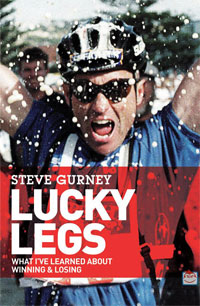 One day I was sitting over at the Weaver household, and Ron comes in and throws this book at me.
One day I was sitting over at the Weaver household, and Ron comes in and throws this book at me.
“You want to read this? I don’t want to. My friends in New Zealand say it’s good.” I looked at it and wasn’t too interested. But while I was waiting for Bridget, I managed to read the first 20 pages. Ehhh… what the hell. So I gave it a whirl.
The story is about Steve Gurney, an adventure racer who won the Coast to Coast across New Zealand, a record, 9 times. He wasn’t the fastest runner, kayaker, or biker, but he had the spirit to keep improving and moving forward. In fact his Grandma told him to study hard because athletics wasn’t something that he was given any talent to do.
The story was written with a humorous tone, and some of Gurney’s stories had me chuckling to myself while I was riding a bike in the gym. For example:
“I recall a real pet goat we once had. … He was called Masport, although he got called something else after he munched on the leg of my favourite jeans hanging out to dry. It was a grave mistake, for student budgets were tight and eventually he was called Stu. Ah, sweet, tender Stu… It was a sad ending for Masport, but it was reality.”
The book goes through his races, his ability to market adventure sport, his kiwi pranks, and life after racing. He’d invent things to show his oppenents on race day just to screw with their minds. He also had to fight off Leptiospirosis after racing in the Malaysia jungles. It’s a good read, and there’s some great insight in the book. It wasn’t a motivational book, but rather a good story with some motivational tips. Here’s what I pulled out:
- Where attention goes, energy flows. Don’t focus on the problem, or it’ll occur. Focus on your goal and enhance the postive things about it.
- Remember to enjoy the ride to the finish line. People who only focus on the outcome tend to quit. To be a multi-winner, you must enjoy the ride. I did this in my marathon. I was absolutely focused on crossing the finish, but I realized that the training and 26.1 miles should be as enjoyable as the last tenth of a mile. (And even now I remember the long runs in the fall through the older neighborhoods, the run in Verdi across the stream, and the Bower mansion loop.)
- Winners always train as if they were second place
- He suggested that things such as recovery runs don’t do much. When you train, train hard. Otherwise, you should rest.
- Losing isn’t failure. Failure is not getting back up and trying again or a different way.
- Every hear this story? A donkey fell down a well. The farmer didn’t think the well or the donkey was worth saving, so the farmer started to fill in the well with dirt and bury the mule. However, the mule realized if he could shake off the dirt, he’d soon be able to climb out of the well. Moral of the story, adversities that come to bury us usually have the potential to benefit us.
- When Gurney was recovering from his illness, he wasn’t looking for pity. The negative comments (“Oh poor you…”) would not let him heal. Rather, he pushed for more positive reinforcement (“Oh that’s great!”) to keep his energy positive, so he would be able to keep moving forward.
- On public speaking, use personal, funny stories. The audience will think you are more authentic.
- A champion team will always beat a team of champions
Those are the ones I remember off the top of my head, but either way, it was a good book.
